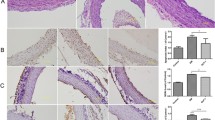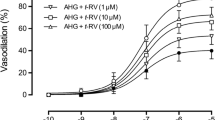Abstract
Globular adiponectin (gAd) has anti-atherogenic effects on the vascular wall. Intermittent hyperglycemia induces endothelial cells (ECs) injury but the physiological factors that may protect against ECs damage are largely unknown. In the present study, we investigated the effect of gAd on ECs dysfunction induced by intermittent high glucose. The gAd significantly attenuated intermittent high glucose-induced apoptosis and oxidative stress in human umbilical vein endothelial cells. This was achieved by decreasing caspase-3 and 3-nitrotyrosine protein expression, increasing nitric oxide (NO) secretion and phosphorylation of Akt, AMPK, and endothelial nitric oxide synthase protein expression. Pretreatment with a phosphatidylinositol 3’ kinase (PI3K) inhibitor, LY294002, partly reversed adiponectin’s anti-apoptotic effect. Taken together, our results indicate that gAd acts as a critical physiological factor which protects against fluctuating high glucose-induced endothelial damage. It may act via attenuating apoptosis and increasing synthesis of NO through both the PI3K/AKT and AMPK signaling pathway to reduce oxidative stress and cell apoptosis.



Similar content being viewed by others
References
M.L. Sheu, F.M. Ho, R.S. Yang, K.F. Chao, W.W. Lin, S.Y. Lin-Shiau, S.H. Liu, High glucose induces human endothelial cell apoptosis through a phosphoinositide 3-kinase-regulated cyclooxygenase-2 pathway. Arterioscler. Thromb. Vasc. Biol. 25, 539–545 (2005)
H. Nakagami, R. Morishita, K. Yamamoto, S.I. Yoshimura, Y. Taniyama, M. Aoki, H. Matsubara, S. Kim, Y. Kaneda, T. Ogihara, Phosphorylation of p38 mitogen-activated protein kinase downstream of bax-caspase-3 pathway leads to cell death induced by high d-glucose in human endothelial cells. Diabetes 50, 1472–1481 (2001)
L. Quagliaro, L. Piconi, R. Assaloni, L. Martinelli, E. Motz, A. Ceriello, Intermittent high glucose enhances apoptosis related to oxidative stress in human umbilical vein endothelial cells: the role of protein kinase C and NAD(P)H-oxidase activation. Diabetes 52, 2795–2804 (2003)
A. Risso, F. Mercuri, L. Quagliaro, G. Damante, A. Ceriello, Intermittent high glucose enhances apoptosis in human umbilical vein endothelial cells in culture. Am. J. Physiol. Endocrinol. Metab. 281, E924–E930 (2001)
T. Ronti, G. Lupattelli, E. Mannarino, The endocrine function of adipose tissue: an update. Clin. Endocrinol. (Oxf). 64, 355–365 (2006)
S.P. Marso, S.K. Mehta, A. Frutkin, J.A. House, J.R. McCrary, K.R. Kulkarni, Low adiponectin levels are associated with atherogenic dyslipidemia and lipid-rich plaque in nondiabetic coronary arteries. Diabetes Care 31, 989–994 (2008)
N. Ouchi, S. Kihara, Y. Arita, Y. Okamoto, K. Maeda, H. Kuriyama, K. Hotta, M. Nishida, M. Takahashi, M. Muraguchi, Y. Ohmoto, T. Nakamura, S. Yamashita, T. Funahashi, Y. Matsuzawa, Adiponectin, an adipocyte-derived plasma protein, inhibits endothelial NF-kappaB signaling through a cAMP-dependent pathway. Circulation 102, 1296–1301 (2000)
J.G. Yu, S. Javorschi, A.L. Hevener, Y.T. Kruszynska, R.A. Norman, M. Sinha, J.M. Olefsky, The effect of thiazolidinediones on plasma adiponectin levels in normal, obese, and type 2 diabetic subjects. Diabetes 51, 2968–2974 (2002)
T. Costacou, J.C. Zgibor, R.W. Evans, J. Otvos, M.F. Lopes-Virella, R.P. Tracy, T.J. Orchard, The prospective association between adiponectin and coronary artery disease among individuals with type 1 diabetes. The Pittsburgh Epidemiology of Diabetes Complications Study. Diabetologia 48, 41–48 (2005)
N. Kubota, Y. Terauchi, T. Yamauchi, T. Kubota, M. Moroi, J. Matsui, K. Eto, T. Yamashita, J. Kamon, H. Satoh, W. Yano, P. Froguel, R. Nagai, S. Kimura, T. Kadowaki, T. Noda, Disruption of adiponectin causes insulin resistance and neointimal formation. J. Biol. Chem. 277, 25863–25866 (2002)
T.A. Hopkins, N. Ouchi, R. Shibata, K. Walsh, Adiponectin actions in the cardiovascular system. Cardiovasc. Res. 74, 11–18 (2007)
H. Kobayashi, N. Ouchi, S. Kihara, K. Walsh, M. Kumada, Y. Abe, T. Funahashi, Y. Matsuzawa, Selective suppression of endothelial cell apoptosis by the high molecular weight form of adiponectin. Circ. Res. 94, E27–E31 (2004)
L.Y. Lin, C.Y. Lin, T.C. Su, C.S. Liau, Angiotensin II-induced apoptosis in human endothelial cells is inhibited by adiponectin through restoration of the association between endothelial nitric oxide synthase and heat shock protein 90. FEBS Lett. 574, 106–110 (2004)
R. Ouedraogo, X. Wu, S.Q. Xu, L. Fuchsel, H. Motoshima, K. Mahadev, K. Hough, R. Scalia, B.J. Goldstein, Adiponectin suppression of high glucose-induced reactive oxygen species in vascular endothelial cells evidence for involvement of a cAMP signaling pathway. Diabetes 55, 1840–1846 (2006)
L. Piconi, L. Quagliaro, R. Assaloni, R. Da Ros, A. Maier, G. Zuodar, A. Ceriello, Constant and intermittent high glucose enhances endothelial cell apoptosis through mitochondrial superoxide overproduction. Diabetes Metab. Res. Rev. 22, 198–203 (2006)
A. Ceriello, M. Ihnat, ‘Glycemic variability’: a new therapeutic challenge in diabetes and the critical care setting. Diabet. Med. 27, 862–867 (2010)
A. Ceriello, Postprandial hyperglycemia and diabetes complications: is it time to treat? Diabetes 54, 1–7 (2005)
L. Nalysnyk, M. Hernandez-Medina, G. Krishnarajah, Glycaemic variability and complications in patients with diabetes mellitus: evidence from a systematic review of the literature. Diabetes Obes. Metab. 12, 288–298 (2010)
E.J. Bastyr, C.A. Stuart, R.G. Brodows, S. Schwartz, C.J. Graf, A. Zagar, K.E. Robertson, Therapy focused on lowering postprandial glucose, not fasting glucose, may be superior for lowering HbA1c: IOEZ Study Group. Diabetes Care. 23, 1236–1241 (2000)
A. Ceriello, K. Esposito, L. Piconi, M.A. Ihnat, J.E. Thorpe, R. Testa, M. Boemi, D. Giugliano, Oscillating glucose is more deleterious to endothelial function and oxidative stress than mean glucose in normal and type 2 diabetic patients. Diabetes 57, 1349–1354 (2008)
L. Quagliaro, L. Piconi, R. Assaloni, R. Da Ros, A. Maier, G. Zuodar, A. Ceriello, Intermittent high glucose enhances ICAM-1, VCAM-1 and E-selectin expression in human umbilical vein endothelial cells in culture: the distinct role of protein kinase C and mitochondrial superoxide production. Atherosclerosis 183, 259–267 (2005)
B. Schisano, G. Tripathi, K. McGee, P.G. McTernan, A. Ceriello, Glucose oscillations, more than constant high glucose, induce p53 activation and a metabolic memory in human endothelial cells. Diabetologia 54, 1219–1226 (2011)
B.J. Goldstein, R.G. Scalia, X.L. Ma, Protective vascular and myocardial effects of adiponectin. Nat. Clin. Pract. Cardiovasc. Med. 6, 27–35 (2009)
Essick EE, Ouchi N, Wilson RM, Ohashi K, Ghobrial J, Shibata R, Pimentel DR, Sam F. Adiponectin mediates cardioprotection in oxidative stress-induced cardiac myocyte remodeling. Am. J. Physiol. Heart Circ. Physiol. 2011 10 (in press )
Wu X, Mahadev K, Fuchsel L, Ouedraogo R, Xu S-q, Goldstein BJ. Adiponectin suppresses IκB kinase activation induced by tumor necrosis factor-α or high glucose in endothelial cells: role of cAMP and AMP kinase signaling. Am. J. Physiol. Endocrinol. Metab. 293: E1836–E1844 (2007)
T.S. Tsao, H.E. Murrey, C. Hug, D.H. Lee, H.F. Lodish, Oligomerization state- dependent activation of NF-kappa B signaling pathway by adipocyte complement-related protein of 30 kDa (Acrp30). J. Biol. Chem. 277, 29359–29362 (2002)
P.H. Park, H. Huang, M.R. McMullen, K. Bryan, L.E. Nagy, Activation of cyclic-AMP response element binding protein contributes to adiponectin-stimulated interleukin-10 expression in RAW 264.7 macrophages. J. Leukoc. Biol. 83, 1258–1266 (2008)
T. Fiaschi, F.S. Tedesco, E. Giannoni, J. Diaz-Manera, M. Parri, G. Cossu, P. Chiarugi, Globular adiponectin as a complete mesoangioblast regulator: role in proliferation, survival, motility, and skeletal muscle differentiation. Mol. Biol. Cell 21, 848–859 (2010)
F. Haugen, C.A. Drevon, Activation of nuclear factor-kappaB by high molecular weight and globular adiponectin. Endocrinology 148, 5478–5486 (2007)
C. Wang, X. Xin, R. Xiang, F.J. Ramos, M. Liu, H.J. Lee, H. Chen, X. Mao, C.K. Kikani, F. Liu, L.Q. Dong, Yin-Yang regulation of adiponectin signaling by APPL isoforms in muscle cells. J. Biol. Chem. 284, 31608–31615 (2009)
G.R. Hajer, Y. van der Graaf, J.K. Olijhoek, M. Edlinger, F.L. Visseren, Low plasma levels of adiponectin are associated with low risk for future cardiovascular events in patients with clinical evident vascular disease. Am. Heart J. 154, E1–E7 (2007)
N. Sattar, G. Wannamethee, N. Sarwar, J. Tchernova, L. Cherry, A.M. Wallace, J. Danesh, P.H. Whincup, Adiponectin and coronary heart disease: a prospective study and meta-analysis. Circulation 114, 623–629 (2006)
R. Wolk, P. Berger, R.J. Lennon, E.S. Brilakis, D.E. Davison, V.K. Somers, Association between plasma adiponectin levels and unstable coronary syndromes. Eur. Heart J. 28, 292–298 (2007)
T. Bouhali, D. Brisson, J. St-Pierre, G. Tremblay, P. Perron, C. Laprise, M.C. Vohl, M.N. Vissers, B.A. Hutten, J.P. Després, J.J. Kastelein, D. Gaudet, Low plasma adiponectin exacerbates the risk of premature coronary artery disease in familial hypercholesterolemia. Atherosclerosis 196, 262–269 (2008)
M.P. Chen, J.C. Tsai, F.M. Chung, S.S. Yang, L.L. Hsing, S.J. Shin, Y.J. Lee, Hypoadiponectinemia is associated with ischemic cerebrovascular disease. Arterioscler. Thromb. Vasc. Bio. 25, 821–826 (2005)
T. Pischon, C.J. Girman, G.S. Hotamisligil, N. Rifai, F.B. Hu, E.B. Rimm, Plasma adiponectin levels and risk of myocardial infarction in men. JAMA 291, 1730–1737 (2004)
C. Lara-Castro, N. Luo, P. Wallace, R.L. Klein, W.T. Garvey, Adiponectin multimeric complexes and the metabolic syndrome trait cluster. Diabetes 55, 249–259 (2006)
T. Yamauchi, J. Kamon, Y. Minokoshi, Y. Ito, H. Waki, S. Uchida, S. Yamashita, M. Noda, S. Kita, K. Ueki, K. Eto, Y. Akanuma, P. Froguel, F. Foufelle, P. Ferre, D. Carling, S. Kimura, R. Nagai, B.B. Kahn, T. Kadowaki, Adiponectin stimulates glucose utilization and fatty-acid oxidation by activating AMP-activated protein kinase. Nat. Med. 8, 1288–1295 (2002)
R. Li, W.Q. Wang, H. Zhang, X. Yang, Q. Fan, T.A. Christopher, B.L. Lopez, L. Tao, B.J. Goldstein, F. Gao, X.L. Ma, Adiponectin improves endothelial function in hyperlipidemic rats by reducing oxidative/nitrative stress and differential regulation of eNOS/iNOS activity. Am. J. Physiol. Endocrinol. Metab. 293, E1703–E1708 (2007)
J. Sun, Y. Xu, H. Deng, S. Sun, Z. Dai, Y. Sun, Intermittent high glucose exacerbates the aberrant production of adiponectin and resistin through mitochondrial superoxide overproduction in adipocytes. J. Mol. Endocrinol. 44, 179–185 (2010)
Y. Hattori, Y. Nakano, S. Hattori, A. Tomizawa, K. Inukai, K. Kasai, High molecular weight adiponectin activates AMPK and suppresses cytokine-induced NF-kappaB activation in vascular endothelial cells. FEBS Lett. 582, 1719–1724 (2008)
P.H. Huang, J.S. Chen, H.Y. Tsai, Y.H. Chen, F.Y. Lin, H.B. Leu, T.C. Wu, S.J. Lin, Chen JW. Globular adiponectin improves high glucose-suppressed endothelial progenitor cell function through endothelial nitric oxide synthase dependent mechanisms. J. Mol. Cell. Cardiol. 51, 109–119 (2011)
Acknowledgment
This study was funded by the National Natural Science Foundation of China (No:81070667).
Author information
Authors and Affiliations
Corresponding author
Rights and permissions
About this article
Cite this article
Xiao, X., Dong, Y., Zhong, J. et al. Adiponectin protects endothelial cells from the damages induced by the intermittent high level of glucose. Endocrine 40, 386–393 (2011). https://doi.org/10.1007/s12020-011-9531-9
Received:
Accepted:
Published:
Issue Date:
DOI: https://doi.org/10.1007/s12020-011-9531-9




